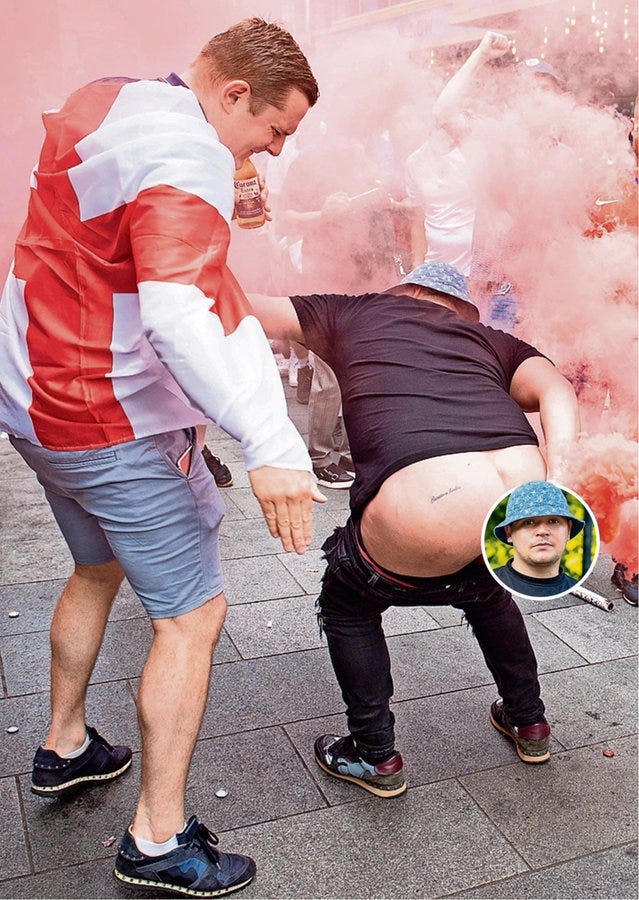12 things you should know about esports economics; UEFA officially loves Unofficial; Juve's €55m Ronaldo bonus; The Unofficial-Leaders hookup; Irony and the Arse Flaming Big Eventer (pt 2)
The newsletter of the podcast
Join the thousands of people who subscribe to Unofficial Partner.
We publish two podcasts each week, on Tuesday and Friday.
These are deep conversations with smart people from inside and outside sport.
This newsletter is our way of picking up the threads, and is published every Thursday.
Our entire back catalogue of 180 sports business conversations are available free of charge here.
Each pod is available on Apple, Spotify, Google, Stitcher and every podcast app.
If you’re interested in collaborating with Unofficial Partner to create one-off podcasts or series, you can reach us by replying to this email.
Going to Leaders? We can get you in cheap
We’re doing a live podcast at Leaders on October 5th-7th, in front of actual real people.
Sean’s bought some new Gazelles specially.
To get 15% off the full ticket price, go via the Leaders Week London website and use the code UnofficialPartner15
12 threads on esports economics
A big new series release this week. Thanks to Nielsen for coming on board.
What’s the second sentence? The aim of the series is to move beyond the surface conversation about audience and demographics. We all get the arguments. Gen Z is where everyone wants to be. But then what?
People make mistakes. Particularly traditional sports teams who create an e-division (?) but then find it doesn’t cohere with the rest of the brand or org culture, particularly given the current vogue for multi club ownership, which is predicated on centralisation. Meanwhile, esports teams - Liquid, Dignitas etc - are content houses servicing partners with digital inventory. These can make traditional sport’s social teams look a bit meh.
Losing is losing. Sports teams often forget the performance bit (a point made by Ralf Reichert on UP Pod #142). They spend the money and then turn around and realise they created a losing team, which embarrasses them, and the whole thing feels less than the sum of its parts.
Player costs are going up. Note Matt Archambault’s point about the ‘nascent player agent market’.
eYears are like dog years. Things just move faster. Previous certainties change, leagues and teams come and go, test and learn etc. Players burn out early. Then they take their audience to YouTube or Discord and become streamers. Side point: A YouTube channel sounds like an old footballer’s pub, only more profitable.
There’s no one single publishing model. Riot Games make League of Legends which is a) enormous and b) free to play, which is crazy talk when you think about it, but has led to a different model based on micro transactions, which in turn opens a door for sponsors, particularly crypto who like the fit (see the recent 7 year deal between LCS and FTX). It makes a shirt deal feel like something from the 1970s, which it is.
The publishers are the Premier League AND Sky. The NBA and ESPN. Riot is the distribution and the production arm. They own the game. It’s their world. So embedded content deals are far easier to pull off.
The media rights market is evolving, but sometimes its hard to work out who’s paying who?
Matt Boyd, Nielsen: I think this space is still kind of figuring that out, but definitely see the YouTubes and the Twitches of the world moving and behaving like some of the bigger, more traditional - for lack of a better word - media operations. Twitch and Amazon are out buying up all kinds of sports media rights; esports and traditional sports.
TSM just sold its team naming rights to crypto trading desk FTX for $210million, the largest publicly quoted deal in esports history. For context, this is roughly what MetLife pay per annum to put their name on the New York Giants/Jets stadium. The opportunity cost of that sort of money is substantial and likely to impact on the appeal of traditional sports sponsorship offer.
At that price point, the ROI model is mainly about media numbers and audience. The livestream is the main driver of value, so integration of team brand in to the stream is the key component: TSM FTX is now a thing, whether gamers and the audience call it that is another matter - see the comparison with stadia naming rights deals above.
Look out for insurance, fintech and crypto categories. Big spikes.
Listen to the Esports Economics Podcast here. And read the full transcript here.
UP Coming: The implications of that China gaming u-turn
On August 30, China announced that from here on in, kids would only be allowed to play video games online for one hour a day from Friday to Sunday between 8:00pm to 9:00pm and on bank holidays.
The decision aims to protect the mental and physical health of children, who are required to log in with real-name registration to be able to play. So, a child cannot just make a fake account and bypass the new laws.
Where’s it going?
“The Chinese talent pool is essentially dead long term underage Chinese players can’t grind the game anymore the CN region will fall behind NA and EU,”
From Reddit: “Coming next season: million of 40-60 years old players join China server with their id card playing 24/7”.
€55 million: The value of getting rid of Ronaldo?
Trion Reid is a equity analyst for Berenberg Bank.
He said something interesting this week, that runs against the prevailing narrative of the commercial impact for Utd of buying Big Ron.
From Off the Pitch (via Michael Broughton on WhatsUP):
PGA Tour defines funniness. Hilarity ensues

It’s famously hard for algorithms to recognise irony on Twitter.
Likewise, sports governing bodies can’t handle jokes.
Which is a shame, because humour - piss taking, irony - is what separates sports fans from customers.
Making your mate laugh is often the whole point. The event is just the context.
Last week, the PGA Tour ejected someone for shouting ‘Brooksie’ at Bryson DeChambeau, the Tour’s most clickworthy new star. (Backstory here if you don’t get the joke).
Yes, it’s dumb. Likewise the bloke who keeps running on the pitch during the England India series, dressed in full kit. He does it cos his mates think it’s funny (and it is btw).
If you want to raise the stakes, ACT TO PROTECT THE BRAND. See how far that gets you.
(Good intro to this piece by Eamon Lynch on Golfweek):
Jay Monahan earns around $4 million a year, which easily qualifies him as America’s most well-compensated babysitter.
Like a teacher telling you to stop laughing, Monahan has just made it worse.
Fans keep doing the wrong type of engagement
The Tour incentivises its players to engage with fans on social media, via its PIP bonus scheme.
DeChambeau is a fascinating golfer and character, and his Marmite persona makes him ideal PIP material.
This is how Patrick Cantlay, who beat DeChambeau in a play off at the weekend, put it:
“Unfortunately, it might be a symptom of a larger problem, which is social media driven and which is potentially Player Impact Program derived,” Cantlay added. “I think when you have people that go for attention-seeking maneuvers, you leave yourself potentially open to having the wrong type of attention, and I think maybe that’s where we’re at and it may be a symptom of going for too much attention.”
I like Cantlay, and this quote. But I’d replace ‘attention seeking behaviour’ with ‘taking the piss’.
‘Attention seeking’ is freighted with class-based assumptions of wannabe stardom.
See also, Lynch’s point about seeking engagement metrics while selling booze:
The line between fan and troll is blurred beyond reasonable enforcement there. Policing language is a perilous task, particularly at a sporting event crowded with people to whom one is happily selling beer by the bucketload.
UP archive - Coked up big eventers
Warning: The future of UEFA is in Unofficial hands
Received this week, from deep within the Masters for International Players course.
Enjoy the Unofficial Partner newsletter? Tell your friends
Subscribe to the Unofficial Partner podcast.
Help us game the Substack algorithm by liking this newsletter and spread the word on social media.
Follow @RichardGillis1 and @PaulPingles (aka the ill-judged Twitter handle of Sean Singleton, the UP co-founder).
Read over 100 gushing five star reviews for UP on Apple Podcasts - click the link to add yours.







